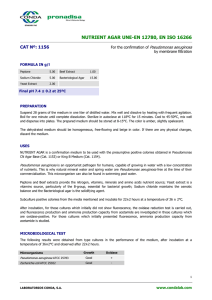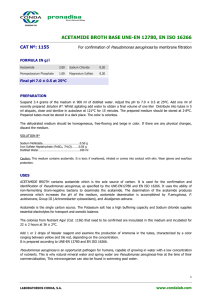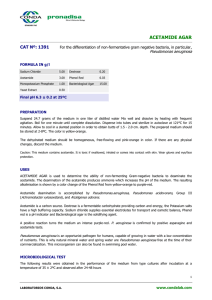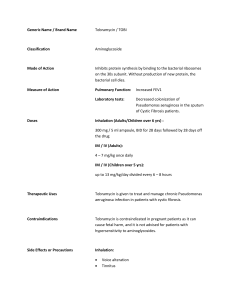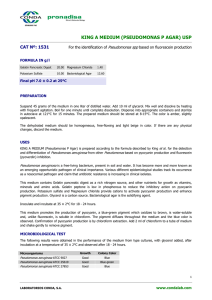ACETAMIDE BROTH UNE-EN 12780, EN ISO 16266 CAT Nº: 2017 Pseudomonas aeruginosa
advertisement
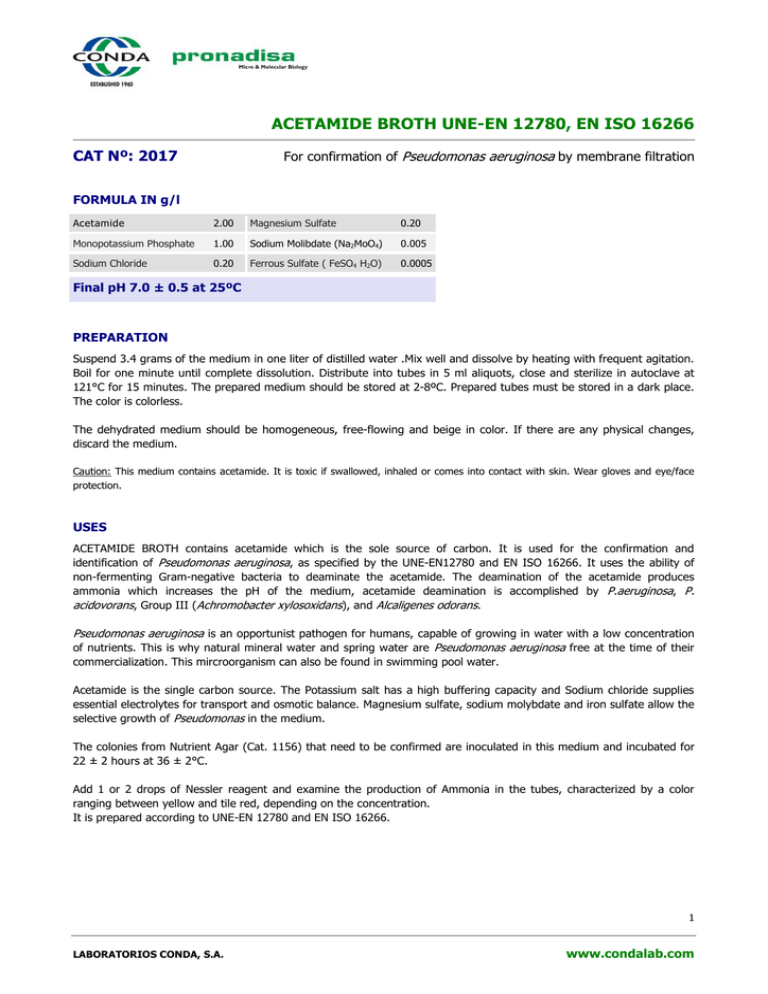
ACETAMIDE BROTH UNE-EN 12780, EN ISO 16266 CAT Nº: 2017 For confirmation of Pseudomonas aeruginosa by membrane filtration FORMULA IN g/l Acetamide 2.00 Magnesium Sulfate 0.20 Monopotassium Phosphate 1.00 Sodium Molibdate (Na2MoO4) 0.005 Sodium Chloride 0.20 Ferrous Sulfate ( FeSO4 H2O) 0.0005 Final pH 7.0 ± 0.5 at 25ºC PREPARATION Suspend 3.4 grams of the medium in one liter of distilled water .Mix well and dissolve by heating with frequent agitation. Boil for one minute until complete dissolution. Distribute into tubes in 5 ml aliquots, close and sterilize in autoclave at 121°C for 15 minutes. The prepared medium should be stored at 2-8ºC. Prepared tubes must be stored in a dark place. The color is colorless. The dehydrated medium should be homogeneous, free-flowing and beige in color. If there are any physical changes, discard the medium. Caution: This medium contains acetamide. It is toxic if swallowed, inhaled or comes into contact with skin. Wear gloves and eye/face protection. USES ACETAMIDE BROTH contains acetamide which is the sole source of carbon. It is used for the confirmation and identification of Pseudomonas aeruginosa, as specified by the UNE-EN12780 and EN ISO 16266. It uses the ability of non-fermenting Gram-negative bacteria to deaminate the acetamide. The deamination of the acetamide produces ammonia which increases the pH of the medium, acetamide deamination is accomplished by P.aeruginosa, P. acidovorans, Group III (Achromobacter xylosoxidans), and Alcaligenes odorans. Pseudomonas aeruginosa is an opportunist pathogen for humans, capable of growing in water with a low concentration of nutrients. This is why natural mineral water and spring water are Pseudomonas aeruginosa free at the time of their commercialization. This mircroorganism can also be found in swimming pool water. Acetamide is the single carbon source. The Potassium salt has a high buffering capacity and Sodium chloride supplies essential electrolytes for transport and osmotic balance. Magnesium sulfate, sodium molybdate and iron sulfate allow the selective growth of Pseudomonas in the medium. The colonies from Nutrient Agar (Cat. 1156) that need to be confirmed are inoculated in this medium and incubated for 22 ± 2 hours at 36 ± 2°C. Add 1 or 2 drops of Nessler reagent and examine the production of Ammonia in the tubes, characterized by a color ranging between yellow and tile red, depending on the concentration. It is prepared according to UNE-EN 12780 and EN ISO 16266. 1 LABORATORIOS CONDA, S.A. www.condalab.com MICROBIOLOGICAL TEST The following results were obtained from type cultures in the performance of the medium, with the respective supplements added, at a temperature of 36 ± 2°C and observed after 22± 2 hours. Growth Ammonium Production Pseudomonas aeruginosa ATCC 9027 Good + Pseudomonas aeruginosa ATCC 10145 Pseudomonas aeruginosa ATCC 25783 Good + Good + Microorganisms BIBLIOGRAPHY UNE-EN 12780, Quality of water. Identification and enumeration of Pseudomonas aeruginosa by membrane filtration. EN ISO 16266 Water quality -- Detection and enumeration of Pseudomonas aeruginosa -- Method by membrane filtration ISO STORAGE 25ºC Once opened keep powdered medium closed to avoid hydration. 2ºC 2 LABORATORIOS CONDA, S.A. www.condalab.com
